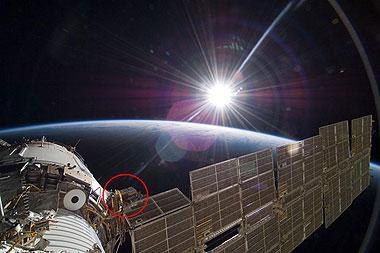EXPOSE-R with microorganisms outside the ISS
EXPOSE-R with microorganisms outside the ISS
Resistant spores of bacillus subtilis have spent 22 months in the 'EXPOSE-R' test container outside the International Space Station (ISS). For the first time during a long-duration mission, they were mixed with artificial meteorite dust and exposed to the harsh conditions of outer space. Scientists at the German Aerospace Center (Deutsches Zentrum für Luft- und Raumfahrt; DLR) are now determining precisely how many of these spores have survived their stay in space. If it turns out that the meteorite dust was able to shield the spores from the harsh space environment, it could mean that microorganisms are capable of surviving in meteorites for long periods of time and travelling from one planet to another.

